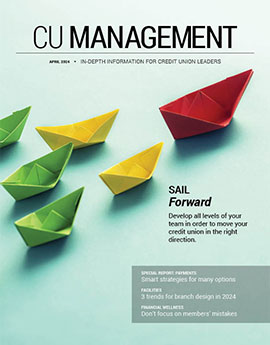3 minutes
Emulation is not a good way to compete.
Editor’s note: Thanks to CUES member Bill Raker, CCE, for comments and help that led to this post. Raker is president/CEO of $1 billion Firefly Credit Union, Burnsville, Minn.
The financial services industry has been challenged by alternative lending programs of a variety of stripes for several generations. The history of financial markets tells us that, while outliers enjoy a strong competitive advantage in the short run, over time, market forces and/or regulatory conditions induce most to either conform to standards or withdraw. For instance, loan sharking—through which borrowers were charged exorbitant interest rates—emerged in the late 19th century and again in the early 20th when consumer and small business liquidity virtually disappeared. Law enforcement agencies had to be called upon to quell both incursions.
A series of credit crunches following the Eisenhower administration spawned the consumer small loan industry (a.k.a., finance companies), which quickly became regulated at the state level. The Great Recession (partnered with the Internet) gave rise to crowdsourcing for consumer loan needs (such as Lending Tree) and supply chain intermediaries (such as short-term loans that could be offered by a package delivery service) or commercial borrowing (such as Fundbox). Thus far, a good number of these organizations remain active in their chosen markets without any specific standards to follow.
Each new entry into lending and banking has offered up innovative approaches to what we now refer to as “know your customer” and new ways to leverage previously untapped technology. As a result of these circumstances, consumers have gained access to credit, one of the key objectives of banking and a driver for national financial health. Through it all, credit unions continued to compete and survive. Now we are confronted with another real (or fancied) competitor on two fronts—fintech-enabled lenders that “rent” access to the U.S. settlement systems and the very real prospect that the Office of the Comptroller of the Currency will issue special-purpose banking licenses to these Silicon Valley newcomers. Likely applicants for special-purpose licenses might include SmartBiz (for U.S. Small Business Administration loans) and Lending Club (consumer credit).
With or without the imprimatur of a banking license, how should the credit union system react to this fintech threat? I believe there are two options: 1) emulate and compete or 2) evolve and compete. While imitation may be the highest form of flattery, emulation is not a prudent way to compete, as demonstrated by any number “dot-bomb” era fatalities like eToys.com and Pets.com. A better strategic course is that of evolving credit union systems to meet these new challenges by adopting (and adapting) the newest forms of technology for not only lending, but all facets of credit union member service. After all, machine learning engines, artificial intelligence tools, and wide-spread and remote distribution systems could be used to support customer service, member house-holding, and new account opening as well as consumer and commercial lending. Moreover, because evolving credit unions could spread the expense of new technology upgrades across multiple types of loans, depository services, and customer service channels, the marginal cost would be less than these new single-threaded competitors would face. And, as we all know, lower cost is the primary basis of competition for fintech upstarts.
Like it or not, fintech is here to stay, representing another competitive threat to traditional member-centric banking and its benefits. By using that movement’s technology and market focus for the benefit of credit union members rather than arguing over its right to compete, I believe that the system will continue to flourish.
John MacAllister is president of Dorado Industries, Rolling Hills Estates, Calif.









